Please consider adding [email protected] to your address book, which
will ensure that our messages reach you and not your spam box.
Read and share online: https://www.fsf.org/blogs/community/libreplanet-2021-day-one-taking-action-to-empower-users
Dear Free Software Supporter,
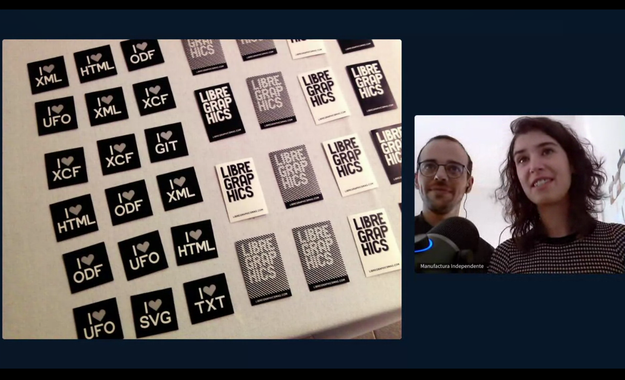
As you may be aware, this isn’t the first LibrePlanet conference that
has taken place entirely online: in 2020, the timing could hardly have
been worse, with coronavirus shutdowns in Massachusetts starting the
very week that the conference was scheduled. With only a week to scrap
plans we had spent most of a year making, the Free Software Foundation
(FSF) still managed to pull off a full, vibrant schedule, and
livestreamed using only free software thanks to our wildly
talented and dedicated tech team, but we knew that with a bit more
time to plan, we could do even more.
So when it became clear, last fall, that an in-person conference in
Boston was still not going to be feasible for spring 2021, we sprang
into action trying to find extra ways to make this conference special
and memorable.
An all-online conference had a few advantages and a few disadvantages:
on the one hand, scrapping the need to travel meant that many talented
voices from all over the globe could submit talks without worrying
about plane fare or accommodations. Even better: while the FSF has
always made an effort to make LibrePlanet activities available from
afar, a fully-online conference could welcome attendees from
absolutely everywhere with an Internet connection. Which meant that
this conference featured speakers from everywhere from the United
States to India, France, Spain, Turkey, and more, with the first count
in the morning showing attendees from thirty-two different countries!
It also meant that registration for the event has been sky-high, with
over 1,100 registrants by this morning (the most ever).
On the other hand, part of the purpose, and the joy, of a yearly
conference is the opportunity to create and reinforce personal
connections across the free software community. Lasting friendships
and professional relationships are born in conference hallways, and
these relationships are part of what has caused the free software
movement to grow and thrive over the last four decades. This is why,
prior to 2020, we always emphasized in-person attendance, and why it
was crucial to add social elements to the 2021 conference.
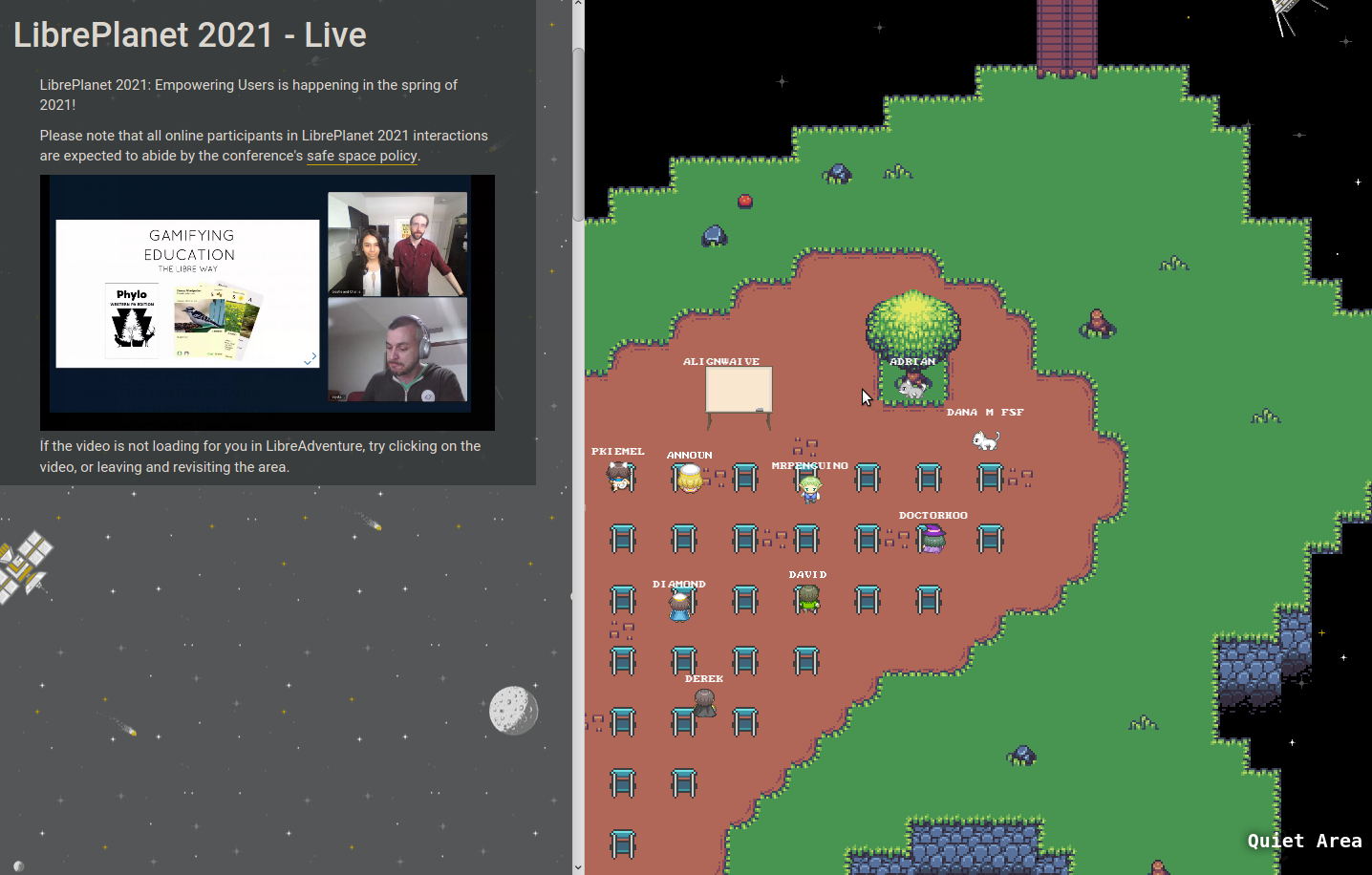
That’s why the 2021 conference included a new space called
LibreAdventure. Made using a fork of the most recent free version of
the WorkAdventure program, LibreAdventure provided virtual physical
session rooms and “hallway space,” as well as an exhibitor hall, which
popped up video chat when your adorable avatar bumps into another
avatar onscreen. Roaming the verdant little islands floating in space,
you might bump into the last person whose talk inspired you, or make a
new friend.
GNU chief webmaster Jason Self told me “I love this LibreAdventure --
walking around and getting to talk to other participants,” and Chris
at the Electronic Frontier Foundation (EFF) told me that
LibreAdventure has given this conference “the closest feel to a real
conference from a virtual conference. It’s been really cool to just
bump into people and chat.” The density of attendance in
LibreAdventure hasn’t been as great as it could be (it’s a pretty
large landscape), so if you didn’t make it in on Saturday, check it
out on Sunday! You’ll be glad that you did.
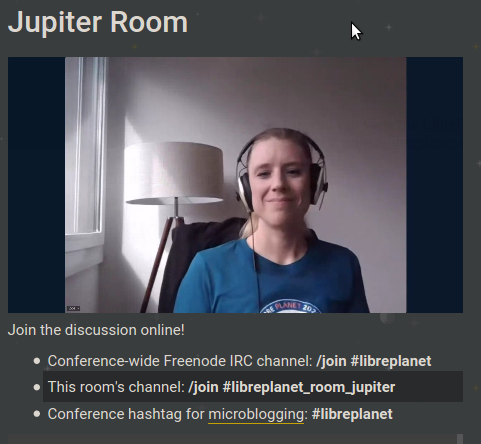
This morning started with a quick address by FSF program manager Zoë
Kooyman, who welcomed our attendees and gave some instructions on how
to get started watching streaming talks in the Jupiter, Neptune, and
Saturn rooms, how to explore LibreAdventure, and how to interact with
other attendees via chat in IRC. The mood in the #libreplanet channel
on IRC was boisterous, and many dozens of attendees said this was
their first LibrePlanet conference, which is exactly what we want to
hear -- the free software movement needs to grow in order to win!
The first session began with Eda Nano (who spoke at the FSF35
anniversary celebration) beaming in from France, representing
April and La Quadrature du Net, to talk about the
Technopolice movement, which analyzes and documents surveillance
technologies in French cities. In the other rooms, longtime
LibrePlanet speaker Stefano Zacchiroli introduced new viewers to the
Software Heritage project, the premier digital preservation
initiative, and Sripath Roy Koganti, general secretary of Swecha AP, a
free software organization in Andhra Pradesh, India, spoke about his
organization’s efforts to create equitable access to digital learning
in a hugely economically stratified country.
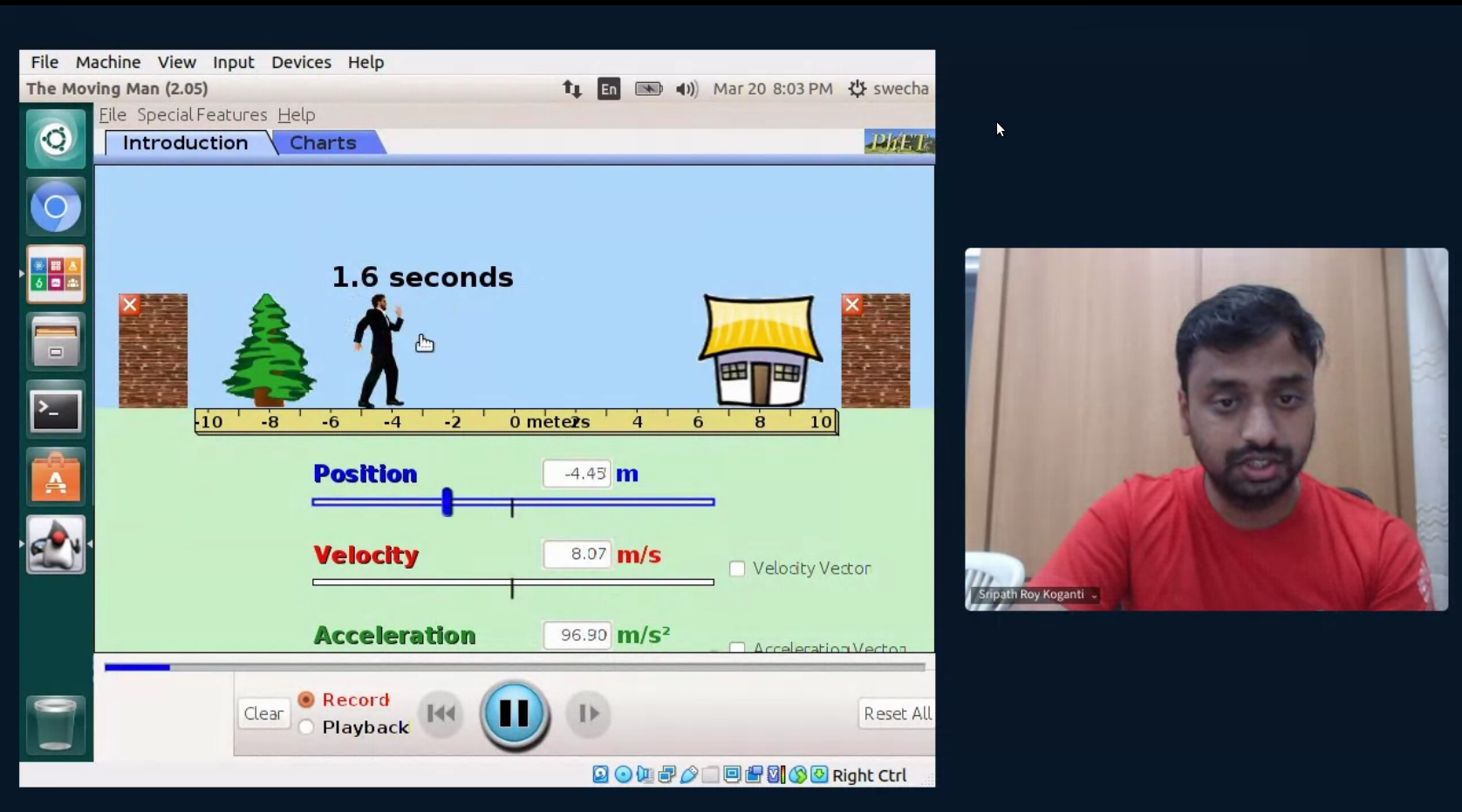
Sripath talked about how in India, there are families with the most
modern devices and Internet access, and top-notch schools -- while
other families don’t even have access to a computer, and some schools
may have as few as eight or nine computers to serve hundreds of
children. GNU/Linux systems, free hardware designs, and freely
licensed educational materials have been crucial to Swecha’s efforts
to expand access, with simulations constructed to help children
understand concepts just as a teacher would demonstrate them in
person, and access to educational materials without needing to be
connected to the Internet. Swecha is gathering students, developers,
and free software activists to develop educational software and
hardware, bring them into schools, train teachers, and more.
Every time slot today was a smorgasbord of tempting choices, and the
second slot of day one was no exception: in the Jupiter room, educator
Mariah Villarreal laid out the state of software in schools, and
shared her insights on how to free students from the abuses of
proprietary educational software; in Saturn, Pouhiou Noénaute, from
Framasoft (who you may also remember from FSF35), described
Framasoft’s many initiatives to free computing in France; and Turkish
free software activists Alper Atmaca and Özcan Oğuz emphasized the
urgent need for free networks in a country where censorship and
government and corporate control are overwhelming.
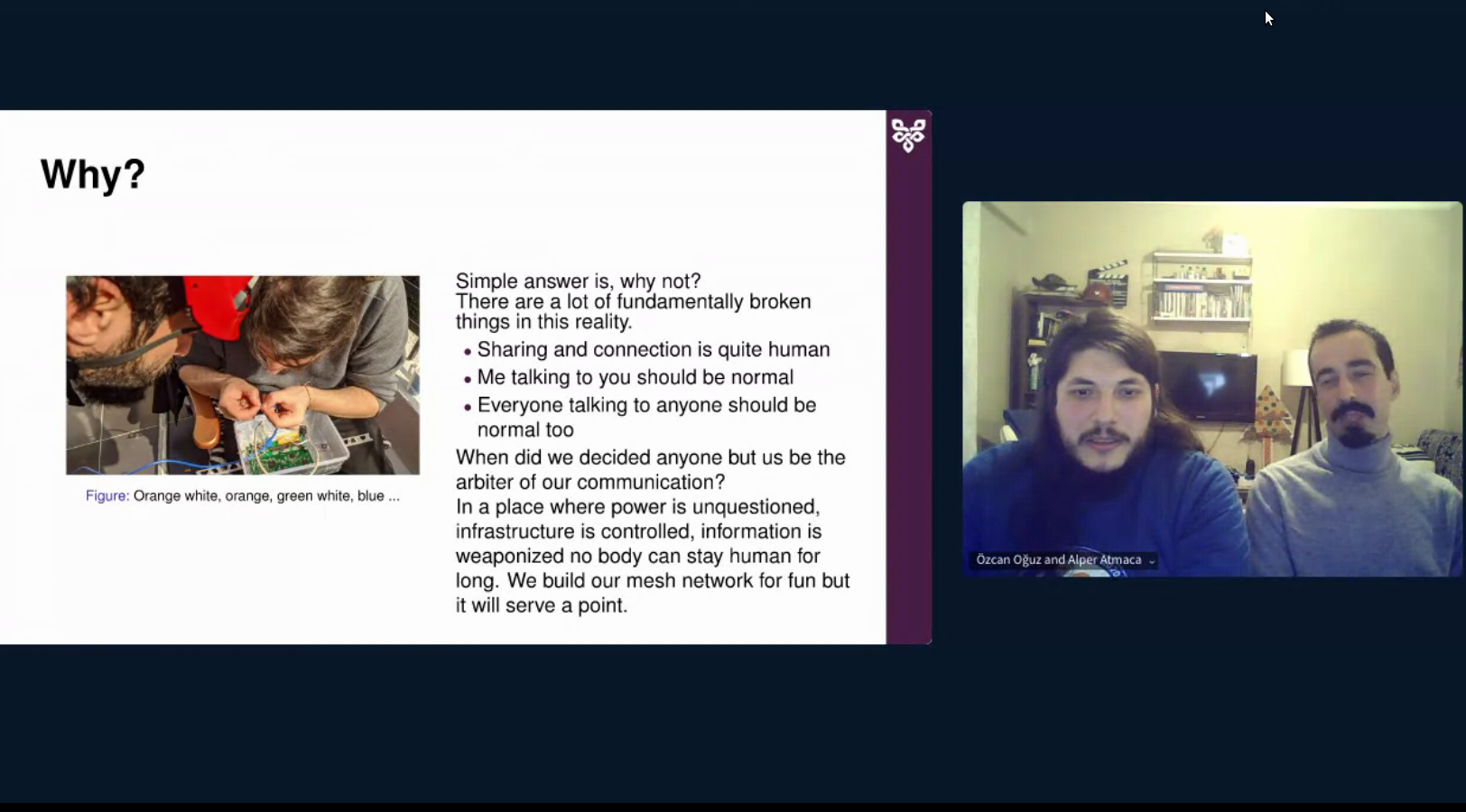
All of these talks were delivered by people doing important work with
great passion and enthusiasm, but I could only watch one talk at a
time, so I turned my attention to Alper and Özcan, who are always a
delight to watch. Their current project, Freifunk Istanbul, is an
effort to extend the work of a German group called Freifunk Ulm into
their own city, utilizing mesh networks to enable people in their
neighborhood to communicate in freedom.
It’s a complex project, with every kind of barrier, from potential
legal problems to expensive equipment to the location of the Bosphorus
River, but Alper and Özcan are cheerfully defiant. One of their slides
asked, “Perhaps we humans suck at keeping democracies? What we are
good at is ingenuity and revolution!” and concluded, “When did we
decide anyone but us be the arbiter of our communication? In a place
where power is unquestioned, infrastructure is controlled, information
is weaponized, nobody can stay human for long.”
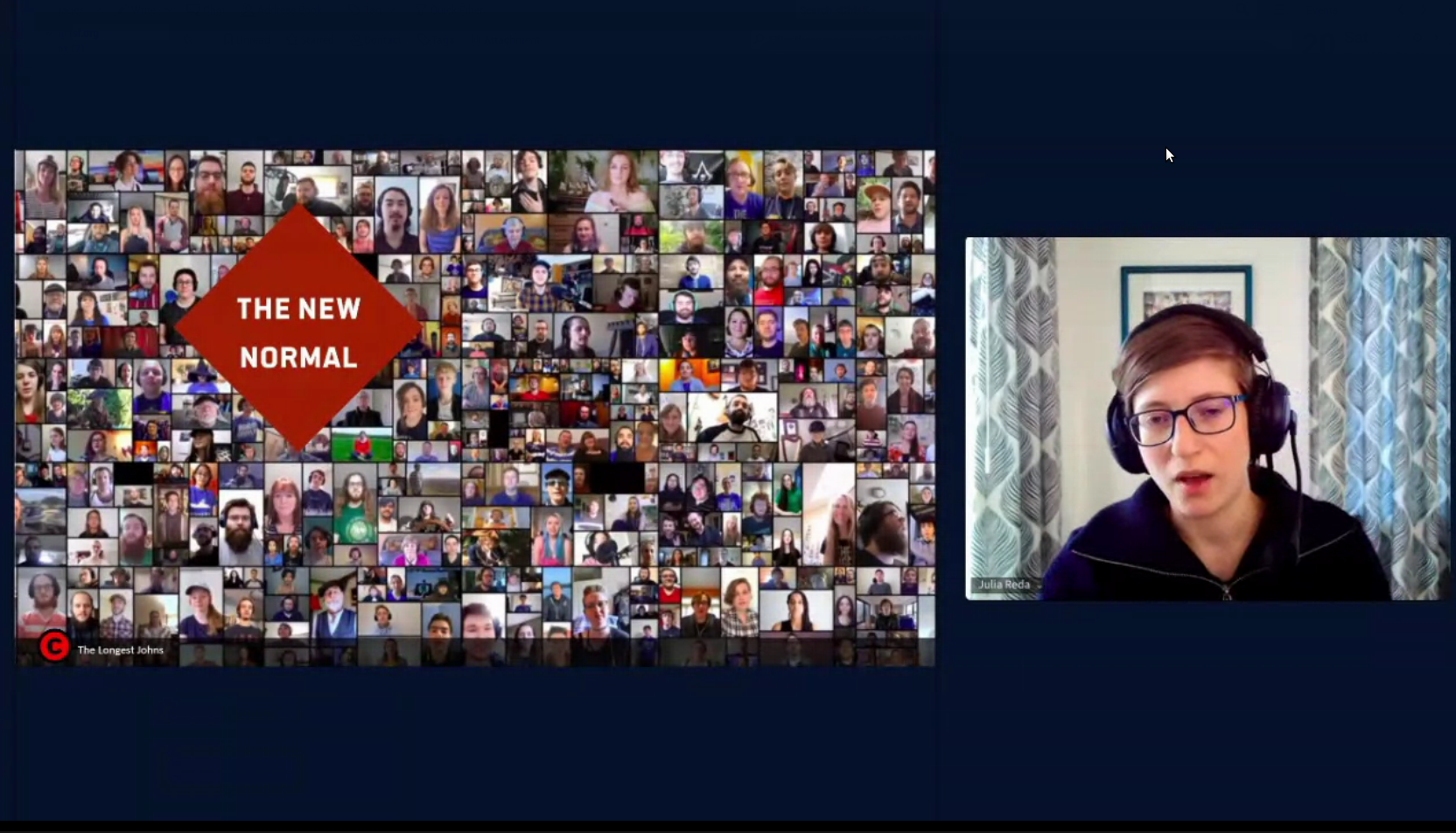
At noon (rather than earlier in the day, since we wanted to maximize
how many participants around the world would be able to join), former
European Parliament member and copyright reform activist, Julia Reda,
delivered the opening keynote. Julia discussed the intersection
between politics and technological freedom, covering topics including
the centralization of power among tech companies, the issues with the
concept of “digital sovereignty” (an ideological framework under which
it would theoretically be fine to have huge tech monopolies as long as
they’re from your particular country), and how governments must not
merely tolerate but must encourage and promote free software.
The 12:55 EDT round of talks featured Etienne Gonnu from April,
talking about free software activism in France and Europe; Giselle
Jhunjhnuwala and Charlie Koch talking about how to use gamification to
encourage and motivate people, and how to use it in the context of
free software and free culture; and Neil McGovern, executive director
of the GNOME Foundation, told the hair-raising tale of how GNOME was
hit with a patent suit in 2019, but ultimately triumphed. Notably,
Neil was enjoying some social time during the GUADEC conference when
he got the news of the lawsuit through social media, just before the
boat he was on, sailing the lovely harbor of Thessaloniki, set sail,
cutting off his Internet access so he had to wait until he returned to
shore to respond!
In the next shift, we learned about the right to repair from iFixit
CEO Kyle Wiens, who correctly noted that all the free software in the
world doesn’t matter if you have no hardware you can run it on, and
got a report back from the FSF High Priority Projects committee from
Sean O’Brien. Manufactura Independente, a research and design studio
in Spain, also told the story of their ten years using only free
software design tools. It may be more complicated to use command line
and git tools to create, share, and collaborate on design projects,
but the results are beautiful and allow for creativity that
proprietary tools are designed to curtail. (You can see some of their
work on the FSF annual reports page!)
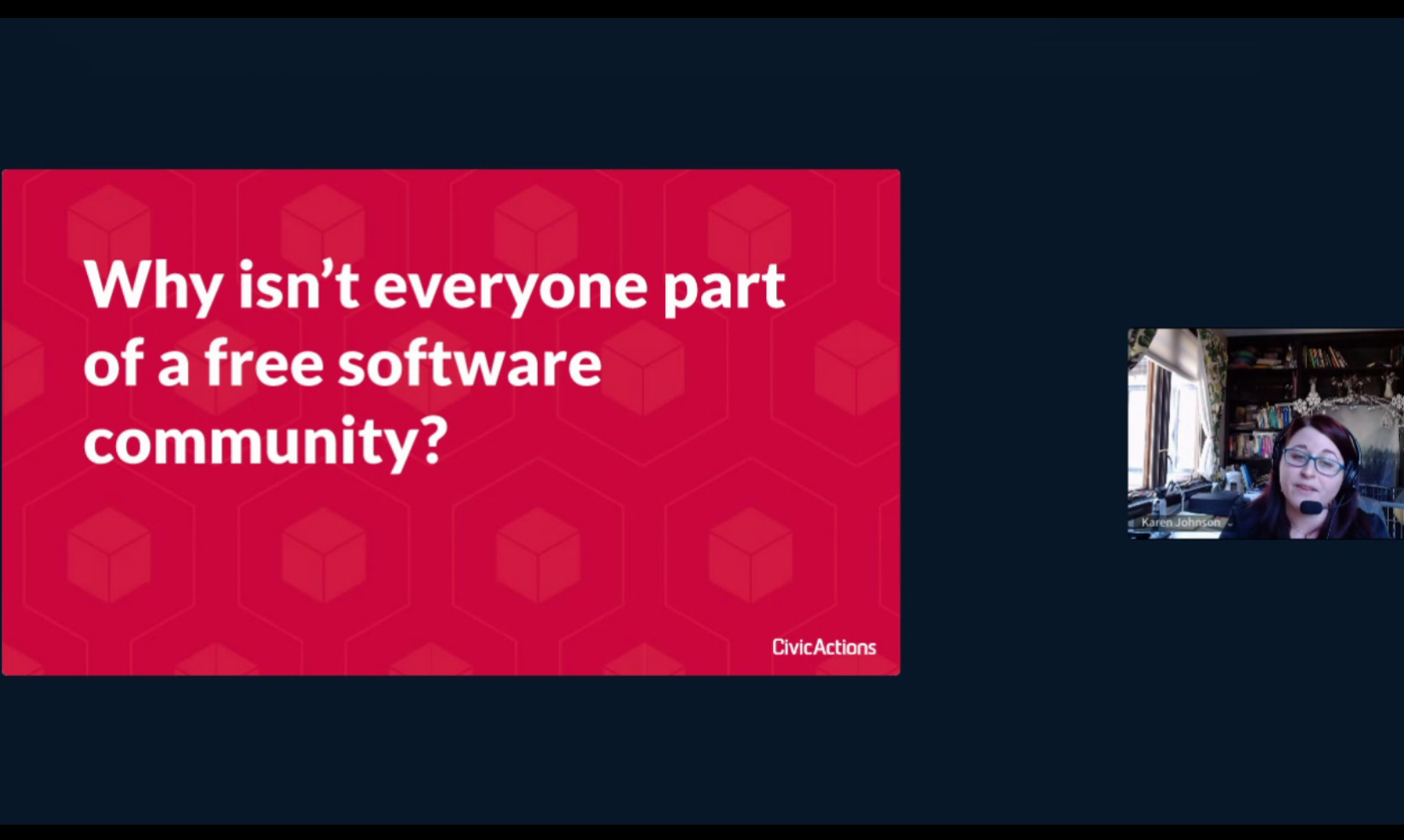
Another highlight was Karen Johnson’s talk, “Building equitable free
software communities for all,” which began with a success story: how
Karen’s love for the video game Doom exposed her to the possibilities
of free software, and how she discovered community after community
that encouraged her curiosity about free software and nurtured her
passion for GNU/Linux, ultimately becoming a volunteer on free
software projects, then a professional systems administrator, and
finally, working for CivicActions, which encourages the use of free
software.
We want free software communities to nurture each new person along the
way until they become a free software lifer, as Karen has, but she
noted, along her journey there were any number of experiences that
were less welcoming and could have shifted her from this path. Pain
points including difficulty getting involved, a lack of training,
limited community time spent training new members, bootstrap
mentality, unclear goals, and community toxicity, can all turn people
away from the rewards of making, proliferating, and advocating for
free software, and combating these factors is crucial to keeping our
movement growing.
A long and very interesting day ended with evening keynotes from FSF
president Geoff Knauth and FSF executive director John
Sullivan. Geoff's talk emphasized the key values of free software, and
the fundamental importance of free software for our rights as human
beings. John's talk included an announcement that the FSF will be
prioritizing work to bring a fully free ebook reader into the
Respects Your Freedom certification program, in order to free
users from dangerous proprietary control over knowledge and
culture. To participate, please visit
https://libreplanet.org/wiki/Group:Hardware/research/e-readers.
Finally, the Free Software Awards ceremony honored individuals and
organizations who have strengthened the free software movement and
used free software on projects of wider social benefit. You can find
out more about our winners and the presentation here.
Reflecting on the talks I attended, I find myself going back again to
an idea from Turkish free software activists Alper Atmaca and Özcan
Oğuz: “Everyone likes to talk and see someone else doing...” It’s one
thing to lament the dangers and abuses of proprietary software, but
ultimately, someone must take action. Today’s conference demonstrated
that there are more people taking action than you might think -- and
together, bit by bit (and commit by commit), we are moving mountains.
We couldn’t be prouder of how this conference has come together. We’re
looking forward to a full day of useful talks and fun conversations
tomorrow, and we hope you are, too!
In solidarity,
Dana Morgenstein
Outreach & Communications Coordinator
Screenshots Copyright © 2021 Free Software Foundation, photos licensed
under CC-BY 4.0. |